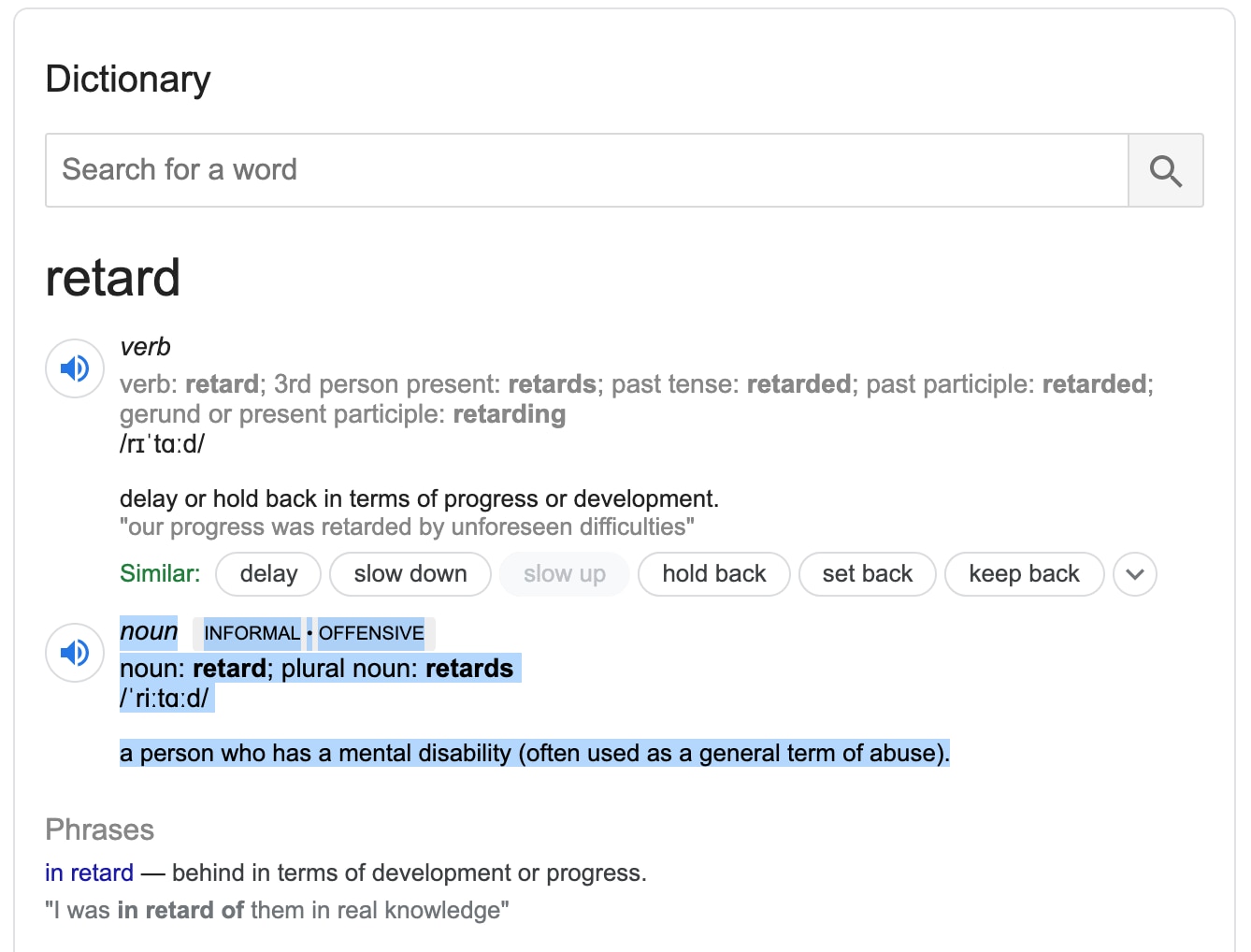Understanding The Phrase: Slobbering Like A Retard And Its Real Impact
Sometimes, a phrase pops up in conversation or on the internet that makes us pause, doesn't it? Like, you know, when you hear something like "slobbering like a retard," it really can make you think about what words mean and how they get used. It's a bit of a loaded expression, isn't it? And, honestly, it brings up a lot of things to consider about language, how it changes, and the feelings it stirs up in people.
This particular phrase, as you might guess, has roots in some pretty old slang, and it's something that, as a matter of fact, can be quite hurtful. We're going to take a look at where expressions like this come from, what they really mean, and why it's so important to pick our words with care. It’s about more than just definitions; it’s about respect and how we talk about each other.
We’ll also separate the slang from the actual physical act of slobbering, which, you know, has its own set of very real causes, some of them medical. So, basically, we'll explore both sides of this expression to get a clearer picture of what's going on when people use it, and why, arguably, we should really think twice.
- Calling Amazon
- List Of Ontario Millstores
- S In Walnut Creek
- The Tides Monterey Ca
- Nate Robinson Draft Pick
Table of Contents
- The Roots of a Phrase: "Retard" and Its Past
- The Harmful Echoes: Why Language Matters
- Understanding "Slobbering": Beyond the Slang
- Choosing Our Words: Building Respectful Communication
- Frequently Asked Questions
The Roots of a Phrase: "Retard" and Its Past
When you hear a term like "retard," it has a very specific history, you know? Originally, and this is pretty important, "the word retard means to hinder or make something slow." It was, in fact, a formal, clinical term. "Mental retardation was a medical term to refer to individuals with intellectual disabilities." So, basically, it had a medical purpose, a bit like other words that describe health conditions.
But language, as we see, changes a lot, doesn't it? Over time, this word shifted from being a clinical descriptor to something entirely different. It became a hurtful slur, used to insult or belittle people. It's really interesting, in a way, how words can take on such different meanings depending on how they're used and the context around them. This particular shift is a clear example of how a word can lose its original, neutral meaning and become something quite negative, something that, honestly, just makes people feel bad.
And that's why, when we talk about phrases like "slobbering like a retard," it’s not just about the words themselves, but about the history and the pain they can carry. The way language evolves, you know, it’s a constant thing, and sometimes, apparently, words get picked up and used in ways that were never intended, and that's when they can cause real harm.
- How Old Jack Black
- Buservice Greyhound
- Lee Minho
- Hilton Hotels On Duvaltreet Key West
- Connecticut Department Of Motor Vehicles Norwalk
The Harmful Echoes: Why Language Matters
The impact of words, especially those used to put people down, is really quite significant. When we use derogatory terms, "like you fucking retard," we're not just saying words; we are, as a matter of fact, "perpetuating negative attitudes and beliefs about people with disabilities." This isn't just about being polite; it’s about creating an environment where everyone feels safe and valued. And that, you know, is something we should all really care about.
Think about it: "We are also creating a hostile environment that can" make people feel unwelcome or judged. No one wants to be treated like "a retard or a small child," do they? It’s a very common experience for people to feel like they are being talked down to, or, like, not seen as capable. This kind of language, basically, chips away at dignity and respect. It's a subtle but very powerful way to diminish someone, and honestly, that's not something anyone deserves.
The slang synonyms for expressions like "slobbering like a retard" might be listed in some places, but that doesn't make them okay. Exploring these terms, as some sources do, might "raise eyebrows," but it’s important to stay informed about the conversation around them, not to endorse their use. The point is, actually, that words have weight, and when we choose to use them, we're also choosing to either lift people up or, you know, bring them down. It’s a simple choice, really, but it has big consequences.
Understanding "Slobbering": Beyond the Slang
Now, let's talk about the other part of that phrase: "slobbering." This word, basically, has a literal meaning that's completely separate from any offensive slang. "Slobbering is a term used to describe the act of drooling excessively from one's mouth." It’s just saliva, you know, coming out more than usual. And, honestly, there are lots of reasons why this might happen.
It’s not always about "just plain old laziness," as some might suggest. The meaning of "slobber is to let saliva dribble from the mouth," and it’s a physical process. Understanding what causes it means looking at both everyday reasons and, importantly, medical ones. So, it's not always something someone can control, and that's a pretty important distinction to make when we're talking about it.
So, when someone is "slobbering," it could be due to a whole range of factors, and it's definitely not something to make fun of. It's a natural bodily function that, you know, can sometimes just happen more than usual. And that, really, is the simple truth of it.
What Causes Excessive Drooling?
Excessive drooling, or "sialorrhea or hypersalivation," is a pretty common thing, actually. It's when you have too much saliva, or, you know, you just can't keep it in your mouth. "Drooling is defined as saliva flowing outside of your mouth unintentionally." It's not something people do on purpose, for the most part. And, honestly, it can be caused by a few different things.
Sometimes, it's just a temporary thing, like when you're really excited or, say, you're a child who hasn't quite developed all their mouth muscles yet. "It’s often a result of weak or underdeveloped muscles around your mouth, or having too much" saliva in general. So, it’s pretty normal for little kids, for example, to drool a lot. And that's just a part of growing up, really.
But then there are other causes, too, which are a bit more serious. "Drooling, or slobbering, is the flow of saliva outside the mouth." It can be from "excess production of saliva, inability to retain saliva within the mouth (incontinence of saliva), or" other underlying conditions. So, it's not always as simple as it seems, you know, and it's important not to jump to conclusions.
Medical Reasons for Hypersalivation
When it comes to medical reasons for excessive drooling, there's quite a list, actually. "You might drool more after a health event like a stroke or as a result of cerebral palsy or multiple sclerosis (ms)." These are serious conditions that affect the body's control over muscles, including those around the mouth. So, basically, it's a symptom of something bigger going on, and it's not something someone can just stop.
"Sometimes, drooling is caused by neurological disorders or other health conditions." This means things like Parkinson's disease or other conditions that affect the nervous system can lead to increased drooling. "Treatments include medication, motor therapy and surgery," which shows that it's a recognized medical issue with actual ways to help manage it. It's not, you know, just a quirky habit.
So, when you see someone slobbering, it's really important to remember that it could be a sign of an underlying health condition. "Slobbering refers to excessive drooling or saliva production, often associated with excitement or certain medical conditions." It’s a physical manifestation, not a character flaw. And, honestly, understanding this can help us be a lot more compassionate and less judgmental, which is, you know, a good thing.
Behavioral Aspects of Drooling
Beyond medical causes, there are also some behavioral aspects to drooling, though these are often less about control and more about context. For instance, "slobbering is commonly associated with certain animals or can describe a child's" natural behavior. Think about a happy dog, you know, with its tongue out and a bit of drool. That's just how some animals express excitement or anticipation.
For humans, especially adults, excessive drooling that isn't medically related might sometimes be linked to deep relaxation, like during sleep, or even intense focus where someone might forget to swallow. However, it's far less common for "laziness" to be the sole cause, as some outdated ideas might suggest. It's usually, basically, a physical response or a temporary state, not a choice. So, it's not really fair to assume, you know, someone is just being lazy if they're drooling.
The phrase "to let saliva or liquid run from the mouth" describes the physical act itself, regardless of the reason. So, while there are behavioral contexts, it’s important not to confuse them with a lack of effort or intelligence. It's about understanding the full picture, and, honestly, giving people the benefit of the doubt, especially when it comes to things they might not be able to help. You can learn more about language and social impact on our site, and also check out our resources on health and well-being for more information.
Choosing Our Words: Building Respectful Communication
The way we speak, you know, really shapes how we see the world and how we treat others. When we use words that are harmful, like the phrase "slobbering like a retard," we're not just being casual; we're, in a way, reinforcing negative ideas about people. It's a bit like a ripple effect, actually, where one hurtful word can spread and cause more pain. And, honestly, nobody wants to be on the receiving end of that.
It's important to remember that "none of the fam chose to have these obstacles." People don't choose to have disabilities or medical conditions that might cause them to drool. So, using language that mocks or disparages them for things they can't control is, basically, unfair and unkind. It’s about empathy, really, and putting ourselves in someone else's shoes. How would you feel, you know, if someone talked about you that way?
In the world of slang, "there are terms that evolve and change rapidly," but that doesn't mean all evolution is good. Some terms, like the one we've discussed, just carry too much negative history and too much potential for harm. So, it's really up to us to make a conscious choice to use language that builds people up, rather than tearing them down. It’s a small change, perhaps, but it makes a huge difference in how we interact with each other every single day. For more on the power of language, you might find this resource helpful: The Power of Language.
Frequently Asked Questions
What does the term "retard" originally mean?
Originally, "the word retard means to hinder or make something slow." It was, in fact, a clinical term used in medicine. "Mental retardation was a medical term to refer to individuals with intellectual disabilities." It was a formal way to describe a condition, not an insult, but its meaning has, you know, changed significantly over time to become a derogatory slur.
What are common medical causes of slobbering or excessive drooling?
Excessive drooling, also called "sialorrhea or hypersalivation," can have several medical causes. "You might drool more after a health event like a stroke or as a result of cerebral palsy or multiple sclerosis (ms)." "Sometimes, drooling is caused by neurological disorders or other health conditions." It can also be due to weak muscles around the mouth or an inability to swallow saliva effectively, which is, basically, a physical issue.
Why is it important to avoid using derogatory terms like "slobbering like a retard"?
It's really important to avoid such terms because "when we use derogatory terms like you fucking retard, we are perpetuating negative attitudes and beliefs about people with disabilities." This kind of language "is also creating a hostile environment that can" make people feel hurt, disrespected, and unwelcome. Choosing kinder words shows respect and helps build a more inclusive community for everyone, which is, you know, what we should all aim for.
Thinking about the phrases we use, and how they impact others, is a really valuable thing to do. It’s about being mindful and, honestly, choosing to communicate in ways that are respectful and understanding. When we talk about "slobbering like a retard," it gives us a chance to reflect on the power of words and our responsibility in using them. So, basically, let's all try to be more thoughtful with our language, because it really does make a difference in the world.

Why Slobbering Hog Matters to Hogs Fans | Locked on Razorbacks

It’s time to end ‘retard’ as an offensive slur | SBS News

vodeb retard